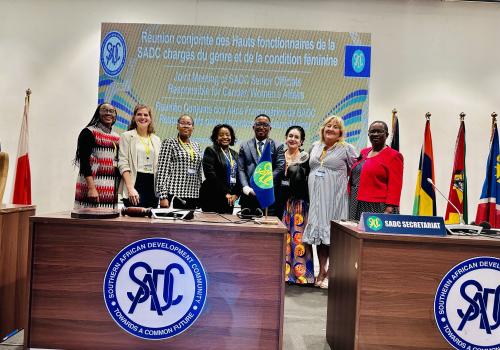The Southern African Development Community (SADC) Secretariat in partnership with the German Agency for International Cooperation (GIZ) through the Partnerships for the Prevention of Gender Based Violence (GBV) in Southern Africa Programme – PfP, hosted a regional dialogue to raise awareness on innovative approaches in addressing GBV in the region on 1st June 2023. The meeting was held on the margins of the SADC Meeting of Ministers responsible for Gender and Women`s Affairs, in Kinshasa, Democratic Republic of Congo.
About 100 participants from government departments, gender experts, and civil society partners within the SADC region participated in the dialogue where knowledge, experiences, and good practices that can be replicated and scaled-up to prevent GBV in the region was shared. The dialogue also identified challenges and opportunities for implementing innovative GBV prevention interventions.
In opening the meeting, SADC’s Head of Gender, Dr Joseph Pitso emphasieed the importance of taking necessary measures to address GBV as provided for in the Revised SADC Protocol on Gender and Development and its operational framework; the SADC Strategy and Framework of Action for Addressing GBV.
The event included a panel discussion were innovative approaches in the region, were exchanged by experts from Lesotho, Malawi, South Africa, United Republic of Tanzania and Zambia. This exchange created an opportunity for regional stakeholders to network and forge collaboration on GBV prevention. The SADC Handbook on Effective GBV Prevention Initiatives was also shared with the participants as a key resource that provides guiding information on implementation of evidence based GBV prevention programmes for the region. The Handbook identifies key entry points for effective GBV prevention, including at household, community and societal levels, with a focus on the primary prevention of GBV.
The meeting highlighted amongst others that:
a) Prevention of GBV should entail a strategy for transforming gender discriminatory or stereotypical cultures, attitudes, and behaviors.
b) Innovation, replication and scaling-up of successful programmes is key for prevention of GBV.
c) Community-driven responses to GBV contribute to sustainability of prevention programmes.
d) Bringing together religious and traditional leaders ensures harmonisation of GBV prevention messages.
e) Digital solutions enable networking between the different stakeholders and creates opportunities for women to access information and be empowered with knowledge.
f) Use of age-appropriate platforms is key to reaching young people with prevention messages.
g) Engagement of men and boys should be more than having men as allies in gender equality but should also address issues of toxic masculinity.
h) Partnerships are important for sustaining prevention programmes.
The outcomes of the exchange will be used to inform future GBV prevention interventions in the region and for further strengthening of stakeholder collaboration in the region.
The SADC Ministers responsible for Gender/ Women’s Affairs meeting convenes on an annual basis to review progress on the implementation of the gender and development programmes in the region. This includes the review of the implementation of the SADC Strategy and Framework of Action for Addressing Gender-based Violence (GBV), including the assessment of the status of GBV in the SADC Region. The 2023 Gender Ministers Meeting will further be used as a platform to highlight the importance of strengthening GBV prevention action and resourcing in the region.

